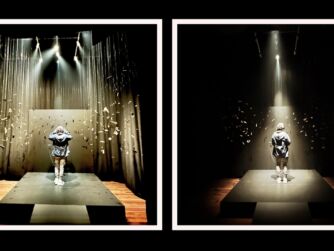 Nick Ochoa is a co-founder of UploadVR, and he was recently at the VRX Virtual Reality Intelligence conference hosting a panel on social VR. Nick talks about of his open questions about social VR such as what does it mean to be a social VR app, and where is social VR going when there could hundreds of applications that have a social aspect to them. He’s found some of the lightweight social VR experiences like Oculus Social Alpha to be some of the most compelling, but that there hasn’t been an experience that he feels really motivated to have with his friends yet beyond sharing some entertainment of movie experiences together. He talks about the importance of audio in social VR, as well as how avatars are used as well as whether the experience will be hosted on a private servers or be open and distributed on the open web like an approach that High Fidelity and JanusVR are taking. Finally, he sees that part of the ultimate potential of virtual empathy is to be able to cultivate experiences of empathy, and he highly recommends checking out the work of Chris Milk and VRSE in that realm.
Nick Ochoa is a co-founder of UploadVR, and he was recently at the VRX Virtual Reality Intelligence conference hosting a panel on social VR. Nick talks about of his open questions about social VR such as what does it mean to be a social VR app, and where is social VR going when there could hundreds of applications that have a social aspect to them. He’s found some of the lightweight social VR experiences like Oculus Social Alpha to be some of the most compelling, but that there hasn’t been an experience that he feels really motivated to have with his friends yet beyond sharing some entertainment of movie experiences together. He talks about the importance of audio in social VR, as well as how avatars are used as well as whether the experience will be hosted on a private servers or be open and distributed on the open web like an approach that High Fidelity and JanusVR are taking. Finally, he sees that part of the ultimate potential of virtual empathy is to be able to cultivate experiences of empathy, and he highly recommends checking out the work of Chris Milk and VRSE in that realm.
LISTEN TO THE VOICES OF VR PODCAST
Become a Patron! Support The Voices of VR Podcast Patreon
Theme music: “Fatality” by Tigoolio
Subscribe to the Voices of VR podcast.
Rough Transcript
[00:00:05.452] Kent Bye: The Voices of VR Podcast.
[00:00:11.953] Nick Ochoa: My name is Nick Otrella, co-founder of Upload VR, and now independent, kind of looking for ways to tap into the industry and have a bigger impact. But what I'm doing here at VRX is moderating the social VR panel and trying to start a dogfight in there. We'll see what happens.
[00:00:30.076] Kent Bye: So what kind of dogfight do you want to instigate? What's your best case scenario for what's going to unfold here?
[00:00:35.593] Nick Ochoa: Well, social VR is a really interesting topic for me. I think there's a lot to be discovered just around social interactions on mobile still. I mean, Facebook comes around and really shakes things up, but then you have, like, Snapchats and Instagrams that emerge and really disrupt things, and we're so early in VR. We have this idea of a metaverse that we'll all be in, this ready player one Oasis concept, but we're so far from that, that people are taking a bunch of different approaches to get there. So Eric Romo and AltSpace have a different approach than Philip Rosedale and High Fidelity, who have a different approach than James at JanusVR. I want to know why they're taking these approaches, and I want to know if they're open to, like, listening and changing, because there's going to be a hundred social VR applications. Social's going to be embedded in other applications. What really is social VR? And I don't know if anybody really has an answer to that, but I'm curious to see the varying perspectives.
[00:01:33.862] Kent Bye: Interesting. And so from your own personal experience, have you had a chance to try out a lot of the social VR? And what's your kind of take of to what the big differences might be?
[00:01:41.949] Nick Ochoa: Yeah, so I've tried AllSpace, I've tried High Fidelity, I've tried Janus, and I've tried Oculus Social, Converge, kind of the run-of-the-mill. But for me, there's a big difference in how people are using avatars is one, how people are networking and linking together. So High Fidelity, for instance, wants everybody's computer to be a server, but Altspace is very much closed, and they're building their own worlds, and it's all gonna be run on theirs. Same with Second Life and their project Sansar. It's all their servers, and they're gonna have, like, a room-based portal that you can jump into and experience. So, for me, I think the most compelling experiences on social have been the lightweight interactions, kind of like the Oculus Social, where I can just be there talking, nod, and have those visual cues. But I'm of the belief that none of the VR, social VR experiences out there right now are the answer. I think that we have to have a million people in headsets to learn how they want to engage with it before we can really build something compelling.
[00:02:43.438] Kent Bye: Well, actually, I would say you may need to have a smaller focus group of people doing very specific things because, you know, in the case of Oculus Social or any of these, you know, if you had a million people go in there, it'd be terrible for everybody. So I think that, first of all, it's getting really nailed down the user experience for a small number of people. So, for example, Oculus Social is limiting how many people could talk at the same time or be in the same room and they're just saying five random people. And I think that's actually really smart because, well, first of all, they're focusing on watching either, at this point, Twitch or Vimeo. You're in a movie theater type environment. But you're also sitting in a half circle facing towards the screen by default. And you almost have to turn your neck in an awkward, uncomfortable position just to have a social interaction. So yeah, I don't know some of your impressions.
[00:03:29.808] Nick Ochoa: I think a lot of that is going to be solved just with the way that they approach audio. So for instance, High Fidelity is working really hard on making sure that the audio in the social world works a lot like the audio in the real world. So you have a room full of 300 people, everybody's voice being the same volume and being able to talk to someone at the other end of the room is a big problem. But if you do audio tricks like someone's on stage in the virtual world, and the people in the back row can barely hear them, like they actually have to physically get closer in the virtual world to hear them, it changes a lot of that. So if we're able to be at a conference with a few hundred people but me and you are kind of in this corner doing this interview, in the virtual world our acoustics should work the same. It's just a much more difficult problem to solve because you're dealing with virtual objects and Sound in the real world travels different off of a concrete wall than it does, you know, a wall that has some sort of padding on it. The difference in the floor makes a huge difference to the echo and how much stuff is in the room. So all these things are going to be solved. But right now we're kind of using tricks to get around it. But I don't know. Again, this is all into the whole idea of I don't know what real social in VR is. What do people want? I don't know.
[00:04:45.239] Kent Bye: Well, what do you want to do in social VR?
[00:04:47.240] Nick Ochoa: In social VR, what I want to be able to do is really share experiences and get reactions from my friends. That's why I really like Oculus Social. Even though it's limited right now, it accomplishes what I want out of social VR, which is to be in a room with some friends, to be able to argue over a movie, to be able to argue over what channel we want it to be on. These are very novel things that you just don't get in a Google Hangout or any other sort of web-based or mobile-based social experience and it's brand new and it's still novel which I get and novelty will fade and we'll probably want much much more just like how on the iPhone the first games all use the tilt feature and accelerometer and we quickly realize that monkey ball is fun for about you know an hour and then you just want to throw your phone at the door and just keep tapping so I want something that is gonna be compelling enough where I'm gonna want to invite my friends over And right now, that's just sharing entertainment content. What that becomes, I don't know.
[00:05:44.125] Kent Bye: I think one of the other interesting things is not only providing these different contexts for social interactions and the form that you create is going to be serving the function. So the form follows function in a lot of ways. But some of the things like, for example, the Oculus Social is being governed by the Facebook's code of contact. And so there's going to be other dimensions there of what are the terms of service of some of these. I know that Upload VR has done a little bit of reporting on that, so maybe you can comment a little bit more in terms of that dimension of the more legalese, like the code of conduct in terms of service and how that kind of plays into the different social interactions.
[00:06:18.193] Nick Ochoa: Yeah, Terms of Service Agreement, signing your life away. We're so used to doing it in social nowadays. Even things like Snapchat now says if you contribute to our story, we own that, we can do whatever the hell we want with it. What is true privacy in VR, in social VR? I don't know. I think that's a really difficult question. That's a great question for me to ask the panel. I don't know what is going to happen when it comes to true privacy in VR, but I know that it's a really, really important thing.
[00:06:49.138] Kent Bye: Well, I think the other flip side is that if you are able to actually record your experiences in social VR, you're kind of creating this time capsule of your experiences that you can actually observe yourself, which I think is that some people may be willing to do that just to be able to have the novel experience of going back in time and, you know, hanging out with their parents or whatnot, and then if somebody passes away or dies, you're able to go relive those experiences or show them to your children that, you know, they may have never had a chance to interact with people in that way.
[00:07:14.589] Nick Ochoa: Yeah, I think that's where the true magic comes in. And that ability to evoke empathy in that way is the beauty of what VR can bring over these other mediums that we're used to. So I'm truly excited and anxious for what's to come. I think that the companies that are tackling these problems have really smart teams. and really novel approaches. But I'm also interested in what the younger generation of people who are going to start growing up with VR from the beginning, you see a two-year-old swipe a television screen to try and change a channel. We're going to have a generation of people like that with VR headsets. What are they going to want? What are they going to do? We don't know. That's what's so compelling about it.
[00:08:00.749] Kent Bye: And so what do you personally think is the ultimate potential of virtual reality and what it might be able to enable?
[00:08:07.715] Nick Ochoa: Just a greater understanding of the world, mostly. The empathy side of things is really the most powerful side of the medium for me. To be in an area and see what they're going through, Chris Milk does a really good job of this with verse pieces, is huge. And if you can affect people on a global scale like that and really make them gain an understanding of what's going on in the world, I think that's the most powerful aspect of the medium. As isolating as VR can be at times, It also opens up a world of opportunities to see and experience things that we've never been able to see or experience before or never would be able to see or experience because of the lack of whether it be money or funds to get to where you would need to go to see these things. So, I mean, when VR is in millions of headsets and one piece of content can touch those millions of people in a way that the news kind of gets to people today, that's going to be huge. It's going to be huge.
[00:09:06.263] Kent Bye: Awesome. Well, thank you.
[00:09:07.480] Nick Ochoa: Thanks, Kent.
[00:09:08.862] Kent Bye: And thank you for listening. If you'd like to support the Voices of VR podcast, then please consider becoming a patron at patreon.com slash voices of VR.




